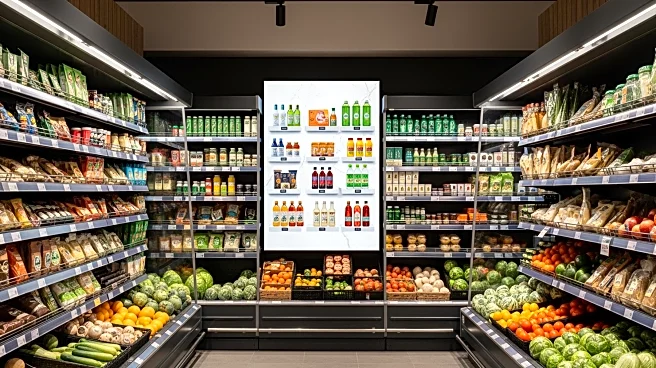What's Happening?
Amazon has introduced a new store-within-a-store concept at the Whole Foods Market in Plymouth Meeting, Pennsylvania. This initiative aims to simplify grocery shopping by combining Whole Foods' organic and natural products with Amazon's national brand
groceries and household essentials. The store features a 10,000-square-foot automated microfulfillment center powered by Fulfil's grocery robotics platform, housing over 12,000 items from both Whole Foods and Amazon. Customers can order a wide range of products, including fresh organic produce, dairy, meat, and Amazon best-sellers, either online or via QR codes in-store. Orders are prepared within minutes, and customers receive notifications to collect their items at the Amazon Pickup & Returns Counter.
Why It's Important?
This development is significant as it represents Amazon's continued expansion into the physical retail space, leveraging its technological capabilities to enhance customer convenience. By integrating Amazon's extensive product range with Whole Foods' offerings, the concept aims to streamline the shopping experience, potentially reducing the need for consumers to visit multiple stores. This could lead to increased customer loyalty and sales for both Amazon and Whole Foods. Additionally, the use of robotics and automation in the microfulfillment center highlights the growing trend of technology-driven solutions in retail, which could influence future industry practices.
What's Next?
The success of this store-in-a-store concept could lead to its expansion to other Whole Foods locations, further integrating Amazon's retail presence. Stakeholders, including competitors and industry analysts, will likely monitor the impact of this initiative on consumer behavior and market dynamics. Amazon may continue to innovate and refine its approach to physical retail, potentially exploring similar partnerships or concepts in other sectors.
Beyond the Headlines
The introduction of this concept raises questions about the future of traditional grocery shopping and the role of technology in retail. Ethical considerations regarding automation and its impact on employment may arise, as well as discussions on consumer privacy related to data collection through app usage. The blending of organic and conventional products also touches on cultural shifts in consumer preferences and the balance between health-conscious choices and convenience.
















